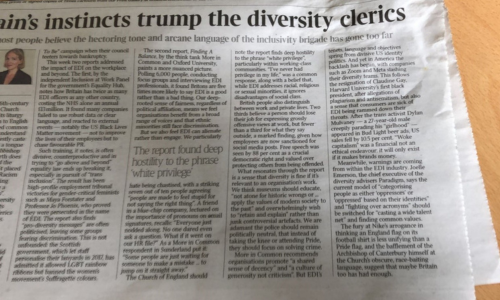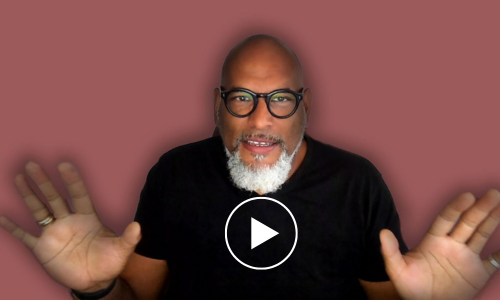It used to be the case that younger people (those between 16 and 29) were more comfortable with emerging societal developments than older people. Not so, it seems, in the case of today’s younger generation, at least about gender equality. According to new research from King’s College London, there is a clear divide emerging in the views of younger people on the subject of gender. The research shows that a consistent minority of 1/5 to 1/3 of men believe that it’s tougher to be a man than a woman right now, that feminism caused more harm than good, and that Andrew Tate raises important points about threats to male identity. This is in stark contrast to the views of women – both younger and older – who believe it is tougher to be a woman today and that this will remain to be the case for the next 20 or so years.
We also read about other backlash against efforts to improve Equity, Diversity and Inclusion (EDI), from anti-EDI legislation in the US to business decisions to cut back EDI efforts based on this backlash.
And the question we want the answer to is: why is this happening?
In my opinion, there are at least two strong reasons for this: (1) lack of understanding of one’s privilege and (2) strong activism.
1. Privilege is blind
The problem with privilege, i.e. the absence of artificial barriers, is that those who have it don’t see it. It never occurs to people with privilege that they have it until someone else points out that they do not. So if, for years, no-one comments on your stellar career trajectory, your ability to connect with influential people, on how you speak and what you say, on your physical appearance, on the tone of your voice, etc. and then all of a sudden all you appear to hear is how someone else should be given a leg up, maybe it feels like ‘they’ are trying to take something away from you, rather than (in reality) add something that’s been missing from ‘their’ lives.
In fact, one might say that the biggest privilege one can have is not to have to think about privilege. As this article in Psychology Today beautifully shows, if we don’t know we are privileged, we don’t have to think about how this invisible understanding of our position in society helps us progress while standing in the way of others. Put this way, we might even say that society has rolled out the red carpet for some of us, while others jostle on the wonky sidewalk for a glance at it.
Sometimes, those jostling on the wonky sidewalk don’t quite understand their own situation. They too want to get onto the red carpet, but they say they have to ‘earn’ their right to be there, fully believing that this is how it’s done. I sometimes hear people from underrepresented backgrounds say that they don’t want a promotion unless it’s strictly on merit. It’s only when I point out the huge underlying – often untrue – assumption that those who already received that promotion (or similar progression opportunities) got it on their own merit, that the penny drops. Of course, we know from countless studies and examples that people prefer to hire, promote or progress those who look and seem more like them; merit rarely makes a difference, although we like to believe that it does.
If our work environments were meritocracies, we’d have a more balanced representation of Diversity at every layer and grouping of our organisations.
So, back to those aggrieved young men. Could it be that, because they are unaware of the lack of artificial barriers in their way, that when existing artificial barriers are removed from another group, it feels like someone is getting something for free, while they are not?
I think it’s normal to feel like the world is conspiring against you if you’re unaware of the privilege you have. It can indeed feel like you’re the victim, you’re the one who’s being asked to sacrifice. But if we could see equity as the pulling down of artificial barriers for everyone, including some of those young men, maybe it would make it easier for us to get behind the idea of equity.
2. Giving minority the upper hand
Those who have been particularly disadvantaged, discriminated against and denied equal rights for a long time feel particularly enthusiastic about the opportunity that society has provided to redress these injustices. It’s no surprise then that there is vigour, sometimes even anger, in some (perhaps many) of their EDI policies, stances and demarcations. But it comes at a price. Some people are reacting negatively to this vigour to redress injustices. Recent articles in The Times report people being made feel stupid for saying the ‘wrong’ thing, and of preaching and lecturing across email communications and new pronoun policies. People also are divided on the need for local governments and museums to atone for historic actions that are being judged by today’s moral compass.

When everything you have ever known suddenly seems wrong, it makes us feel bad about ourselves, and that’s something that human nature is designed to counteract, push back on. In a way, it’s a form of negativity bias, a bias that makes us perceive the negative as a stronger motivator than the positive. We see the negative in others’ attempts to level the playing field (i.e. EDI efforts) as a criticism of who we are and resist. Instead of seeing the intention to equalise, we feel attacked and lash out.
Pushback is part of every story of change. We will inevitably move a bit backwards before we continue to move forwards. Many stories of progress – including iconic ones like the Industrial Revolution – evidence this tendency.
We need to give people time to adjust and listen to their concerns. So, when we at Voice At The Table speak about Inclusion, we mean all voices, including those that appear to detract from the trajectory of travel. We don’t point fingers or blame people for not knowing how to express themselves more inclusively. We understand that all voices have the right to be heard. We don’t have to agree with them, no. But we also don’t have to persuade them. We just need to explain our perspective (with examples) and understand that change travels at different paces for different people. Some people might take longer to understand and come along and, indeed, a small portion of the population may never come along. And, that too is OK. This is the beauty of Diversity – we don’t all have to have the same view of the world. Once we’re able to accept this, we will truly have made a huge leap forward.
Suggested Reading





